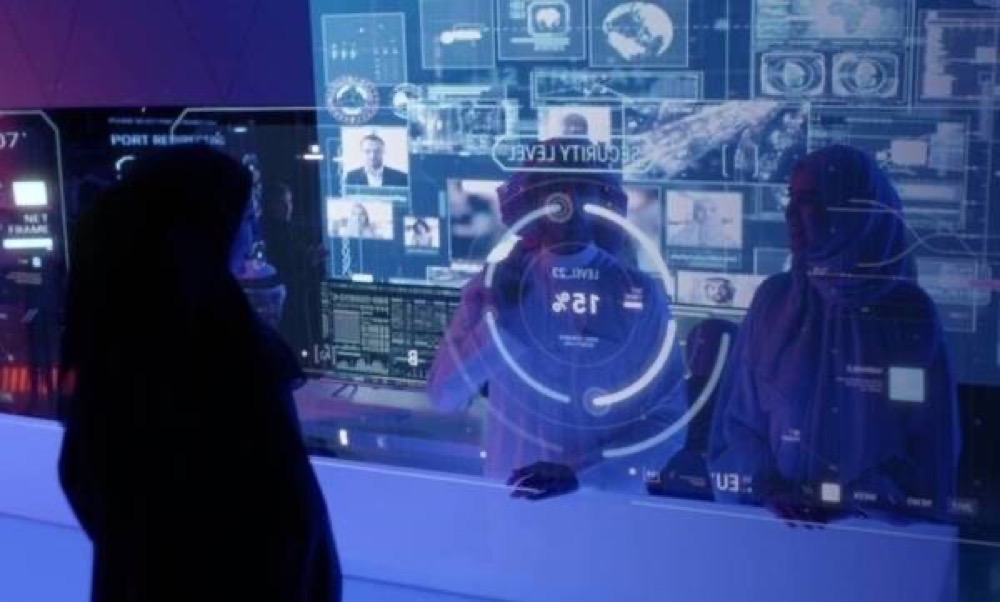RIYADH: As the digital world becomes more interconnected, the frequency and sophistication of cyberattacks are on the rise. In response, governments and companies are increasingly turning to artificial intelligence to fortify their cybersecurity measures.
Among the global leaders in this space is Saudi Arabia, which has emerged as a critical player, not only adopting AI-driven cybersecurity solutions but also making significant strides in the global rankings for preparedness.
In 2024, Saudi Arabia secured the top spot in the UN Global Cybersecurity Index, achieving a perfect score of 100/100 across five critical pillars: legal, organizational, cooperation, capacity development, and technical measures.
This achievement reflects the Kingdom’s commitment to building a resilient cybersecurity infrastructure across both the public and private sectors.
Indeed, the Saudi Arabia government’s investments in cybersecurity products, services, and solutions surged to SR13.3 billion ($3.55 billion) in 2023, a 10.83 percent increase from the previous year.

A key component of the Kingdom’s cybersecurity success is its integration of cutting-edge AI technologies, which are transforming the way cyber threats are identified and mitigated.
“As cyber threats grow in complexity and frequency, traditional security measures often struggle to keep pace,” Moataz BinAli, regional vice president and managing director for the Mediterranean, Middle East, and Africa region at Trend Micro, told Arab News.
“This is where AI steps in, offering a new level of defense through enhanced automation, predictive capabilities, and real-time analysis.
By harnessing the power of AI, organizations can now sift through massive datasets in real time, flagging suspicious activities that might otherwise go unnoticed.
This capability is crucial in a world where cyber threats are becoming increasingly sophisticated, allowing businesses to stay one step ahead of potential attackers.
“AI-powered tools can help organizations stay ahead by learning from previous cyberattacks and continuously adapting to new tactics used by hackers,” said BinAli. “This adaptive nature is crucial as cyber threats become more sophisticated.”
BinAli points out that phishing and ransomware are among the most common types of cyberattacks.
Phishing involves attackers using deceptive emails to trick users into revealing sensitive information, while ransomware encrypts a company’s data, with hackers demanding payment for its release.
However, such attacks are preventable with the right precautions. BinAli says a multi-layered approach to cybersecurity is required, starting with basic steps.

“Enforcing strong password policies and using multi-factor authentication are essential steps that add extra layers of security,” he said. “Regular software updates are equally important to protect against known vulnerabilities, ensuring systems and applications stay secure.”
Employee training is another critical component of this defense strategy. “For companies, employee training and awareness are critical. Human error, often exploited through phishing and social engineering, can be minimized through continuous education.”
While AI has undeniably transformed cybersecurity, it also presents new challenges. Cybercriminals are increasingly weaponizing AI, using it to automate phishing campaigns, develop more adaptive malware, and bypass traditional security measures.
“Hackers use AI to automate phishing campaigns, develop more adaptive malware, and bypass security defenses, making them more difficult to detect and counter,” said BinAli.
False positives are another downside of AI-powered cybersecurity tools. According to Trend Micro’s Attack Surface Risk Management data, more than 40 percent of companies using AI for cybersecurity report excessive false alerts.
These false positives can overwhelm security teams and divert their attention from real threats.
“AI systems also heavily depend on the quality of the data they are trained on. Without robust, diverse datasets, AI models risk leaving critical vulnerabilities exposed,” said BinAli.

Trend Micro, a global leader in cybersecurity, is one of the companies at the forefront of AI-driven security solutions.
Its flagship platform, Trend Vision One, leverages AI-driven technologies to offer extended detection and response across a wide range of environments, including endpoints, emails, networks, and servers.
This unified approach provides real-time threat monitoring and proactive response capabilities.
Additionally, Trend Micro’s Attack Surface Risk Management offers companies a comprehensive view of potential vulnerabilities, enabling them to address areas of weakness before they can be exploited.
“AI-driven solutions like these will be pivotal in protecting against cyberattacks and data breaches,” said BinAli.
DID YOU KNOW?
1. Saudi Arabia topped the 2024 UN Global Cybersecurity Index with a perfect score of 100/100 across 5 key pillars.
2. Saudi cybersecurity spending reached SR13.3 billion ($3.55 billion) in 2023, a 10.83% increase from the previous year.
3. AI helps detect cyber threats in real time by sifting through vast datasets and flagging suspicious activities earlier than humans can.
4. Phishing and ransomware are the most common cyberattacks, but a multi-layered approach can prevent them.
Saudi Arabia’s success in the cybersecurity arena is part of a broader strategy that aligns with the Kingdom’s Vision 2030 goals of economic diversification and technological advancement.
With AI playing an increasingly central role in its cybersecurity initiatives, the Kingdom is setting a global standard for other nations to follow.
As cybersecurity threats continue to evolve, AI-driven solutions will remain essential in safeguarding not only Saudi Arabia’s digital infrastructure but also the data and systems of organizations around the world.
With its robust investments in cybersecurity and commitment to integrating the latest technologies, the Kingdom is well-positioned to lead the fight against cyber threats on the global stage.


































